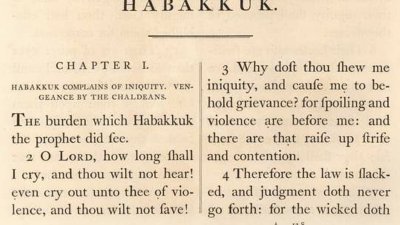There’s a principle in Bible study about interpreting less clear passages in light of more clear passages. When you come to something you don’t know, remember what you *do* know. This applies in a lot of places, because there are probably a lot of things we don’t know.
Habakkuk knew that the LORD was righteous; Habakkuk’s first complaint depends on it. The Lord had revealed His law, why is He allowing the law to be paralyzed? The Lord is powerful and right, why is He apparently passive about wrong? The Lord cares, why isn’t He responding to Habakkuk’s cries?
I often think of the various ways the Lord could respond to things as if He has a warehouse full of possibilities. Who could have more? He’s not limited by imagination or by resources. He sees *all* the things that happen, He sees all *hearts*, and He could respond almost any way He wanted.
The Lord opened the door to His response arsenal for Habakkuk to see. His choice response for the violence in Judah was not inactivity as it seemed to Habakkuk. The Lord had been preparing nations and pushing them into place on the board, getting things set up for the very judgment Habakkuk was crying for.
Except it wasn’t exactly what Habakkuk had in mind. Habakkuk cried, “Help!” And then, “Wait! Not like that!” The Lord was raising up the Chaldeans, whom we refer to as the Babylonians, who were going to scoff their way past kings and sweep their way through the land gathering captives like sand. This burden moved Habakkuk to raise his second complaint. He starts with what he knows, asks another version of how long, and then prepares himself for an answer.
# What Is Proper - Truth (verse 12)
The first question is based on Habakkuk having passed his theology class.
> Are you not from everlasting,
> O LORD my God, my Holy One?
> We shall not die.
> O LORD, you have ordained them as a judgment,
> and you, O Rock, have established them for reproof.
> (Habakkuk 1:12 ESV)
The prophet starts with theology *proper*, with the character and attributes of God as God *revealed* through God’s Word from which Habakkuk views the world. God is **everlasting**, which isn’t only about God’s relationship to a timeline but God’s dependability all the time. World history is the lagging measure of God’s eternal will. He is **LORD**, *Yahweh*, the “I am” who IS, who exists, and who revealed Himself and made covenant with Israel. **My God**, and **my Holy One**, refer to the sovereign and the divinely separate.
Habakkuk knows (by faith) this LORD, and can state **We shall not die.** The only way to make this claim is based on theology, on God’s faithfulness to God’s promises when God chose a people. There would be judgment, even brutal judgment, but it wouldn’t be annihilation of the nation…at least not if Habakkuk’s theology proper was proper.
Yet the Lord **ordained** and **established**the Chaldean/Babylonians as **judgement** and **reproof**. Habakkuk acknowledges the Lord’s answer, but this raises an argument.
# What Doesn’t Seem Proper (verses 13-17)
Verse 13 builds two parts complaint on two parts proper theology.
> You who are of purer eyes than to see evil
> and cannot look at wrong,
> why do you idly look at traitors
> and remain silent when the wicked swallows up
> the man more righteous than he?
> (Habakkuk 1:13 ESV)
Habakkuk got his standard of justice from the Lord. Habakuk argued that violence and wrong were **wrong** because the Lord said it was wrong, and the law of the Lord comes from the nature of the Lord; He is **of purer eyes**. He can’t look at it or tolerate it, same as Habakkuk said in verse 3.
So how does that fit with the Lord raising up (verse 6) and having ordained/established (verse 12) **the wicked** to deal with wickedness, especially when, by comparison, those being punished are **more righteous**?
Habakkuk not only knew theology, he had enough familiarity with foreign affairs to know that the Babylonians were pretty much doing whatever they wanted, and what they wanted was bad. If the Chaldeans **swallow up**, where will the Lord’s faithfulness be seen? (See the after-swallowing lament: Lamentations 2:2, 5, 16).
Verses 14-15 point out how the proper place of man has—by God’s doing—been turned upside-down.
> You make mankind like the fish of the sea,
> like crawling things that have no ruler.
> He brings all of them up with a hook;
> he drags them out with his net;
> he gathers them in his dragnet;
> so he rejoices and is glad.
> (Habakkuk 1:14-15 ESV)
When I read this description I update it in my mind to shooting fish in a barrel. The Babylonians didn’t have guns, but it is as if **mankind**—here the word *ʾādām*—the rest of the nations, were brainless, helpless little guppies at the mercy. They were less than men, or at least treated as such. The **crawling things** are the same as referenced in the creation account, swarming in the water.
And who did it? **You make**, *God* made men to “have dominion over the fish of the sea” (Genesis 1:28), all the swarms of living creatures in the waters (Genesis 1:20), how can this turnover be proper?
There’s a **hook**, a **net**, and a **dragnet**, which would be a net for more than an individual. They are caught, gathered together, and dragged away.
This could be an extended ichthyological (dealing with fishes) metaphor. But, there’s some historical reasons to think at least some of it is physical, as the Babylonians followed the Assyrians by piercing captives’ lower lips with hooks, leading them on a string. Were there also human-sized nets?
> Therefore he sacrifices to his net
> and makes offerings to his dragnet;
> for by them he lives in luxury,
> and his food is rich.
> (Habakkuk 1:16 ESV)
The Lord said that the Babylonians “own might is their god!” (verse 11). And the **sacrifices** and **offerings** are part of that worship, celebrating the weapons of their victory. These are the tools that enable their lifestyle of **luxury** and **rich food**. The word “luxury” is fine, but the KJV says “their portion is fat, and their meat plenteous.” They liked their plunder so much they worshiped their shopping bags.
> Is he then to keep on emptying his net
> and mercilessly killing nations forever?
> (Habakkuk 1:17 ESV)
The question is a desperation “how long?” will this go on? Will it stop? They fill the net, empty the net, like relentless waves on the shore. We’ve got almost nine more months of this administration?
# What Is Proper - Trust (verse 2:1)
It’s one of those bad chapter breaks, and, we can get over it.
> I will take my stand at my watchpost
> and station myself on the tower,
> and look out to see what he will say to me,
> and what I will answer concerning my complaint.
> (Habakkuk 2:1 ESV)
Habakkuk has been complain-praying, but talking about God and the Babylonians. Now he adds a little third-person narration.
Habakkuk is girding his loins for the Lord’s reply, which he knows is coming. The rest of chapter 2 is that **answer concerning [his] complaint**. This is one way to translate the end of the verse, another is, “how I may reply when I am reproved” (NASB), suggesting that Habakkuk expected the Lord’s answer to correct him.
He was a *watchman*, and it was proper for him to wait for the word of the Lord.
# Conclusion
When the earth is not yet filled with the knowledge of the glory of the LORD (see Habakkuk 2:14), *and* some real pieces of work are in charge, what then? How do we get our clear theology up next to the disordered world?
Here are Habakkuk's hacks for handling __deserved__ political catastrophe, or tips for when you're a tiny citizen fish in a totalitarian barrel: (and yeah, stated in a playful way to get your attention, but dreadfully serious about the counsel)
- Learn to hate any corruption of justice, large and small, and the strife such corruption causes. Hate lies and bribes more.
- Do no wrong to your neighbor, even when it appears that you could get away with it. This includes verbal wrong in the parking lot behind their back, financial wrong in a business deal, any wrong.
- Complain (lament and cry) to God, in personal prayer and assembled psalm-singing. Let it be known that our help is in the name of the Lord who is in His holy temple (Habakkuk 2:20).
- Get on board that God works in mysterious ways, including His abundant arsenal of judgments. Theology proper that fits neatly on the page may be prim and yet not fully proper. That said, one reason people lose their minds is because they never knew God as God reveals Himself in His Word.
- Build all your life on the Rock, hearing and doing His words, so that your house will not fall when the floods come (Matthew 7:24-25).
- Then get wisdom and pursue zeal to take every advantage of any open door God puts in front of you to honor Christ the Lord as holy (1 Peter 3:15).
----------
## Charge
George Bernard Shaw said, "Democracy is a device that ensures we shall be governed no better than we deserve.” And in our temporal citizenship, that resonates. But also "our citizenship is in heaven, and from it we await a Savior, the Lord Jesus Christ." So live as HE deserves.
## Benediction:
> Peace be to the brothers, and love with faith, from God the Father and the Lord Jesus Christ. Grace be with all who love our Lord Jesus Christ with love incorruptible. (Ephesians 6:23–24 ESV)






